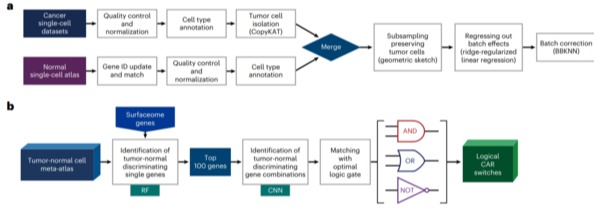Although hundreds of people die from cancer every day, scientists have been struggling to find a cure for decades due to its heterogeneity and variability. Among the various immunotherapies which employ chemical substances to stimulate the immune system to fight cancer, chimeric antigen receptor (CAR)-mediated immunotherapy has recently been recognized as promising. Cells with CAR contain external domains that recognize antigens presented in tumor cells and bind to them. This activates T cells, which are a type of crucial white blood cells that destroy tumor cells. This immuno-oncology technique is expanding its application to a wider range of cancer types after yielding successful outcomes in curing hematologic cancer beginning in blood-forming tissues. However, due to its inaccuracy in selectively targeting tumor cells, more research on designing CARs with effective cancer-killing capabilities and minimal side effects was needed.

To overcome this problem, a joint research team led by Professor Jung Kyoon Choi from the Department of Bio and Brain Engineering and Professor Jong-eun Park from the Graduate School of Medical Science and Engineering designed “smart immune cells” with the help of artificial intelligence and big data analysis. This technology is expected to be a next-generation immuno-oncology treatment that enables CARs to operate through a logic circuit to accurately target cancer cells only. This research was published in the international journal Nature Biotechnology on February 16 under the title “Single-cell mapping of combinatorial target antigens for CAR switches using logic gates”.
The research team first constructed a “tumor-normal single-cell meta-atlas” which integrates all the gene expression data of millions of single-cell transcriptomes. This data was utilized to train a deep learning neural network that can detect differences in gene expression patterns between tumor and normal cells based on logic circuits — AND, OR, and NOT — by considering the combinations of unique gene expression patterns to deduce the identity of a cell. The CAR immune cells equipped with the logic circuit found through this methodology can work like a computer to distinguish between cancer and normal cells, allowing them to accurately target cancer cells without side effects.
According to Dr. Joonha Kwon, the first author of the published paper, the study “presents a methodology that has never been attempted before”. The most notable aspect of this approach is that the research team simulated millions of individual tumor and normal cells to find the optimal decision-making circuits for CAR cells. He further continued, “This is a breakthrough in the application of artificial intelligence and computer logic circuits to immune cell engineering, and is expected to play an important role in expanding CAR cell therapy, which has been successfully used in blood cancers to solid tumors.” The emerging integration of biology, informatics, AI and mass data is expected to foster the analysis of such simulations and help discover previously unknown logics.

